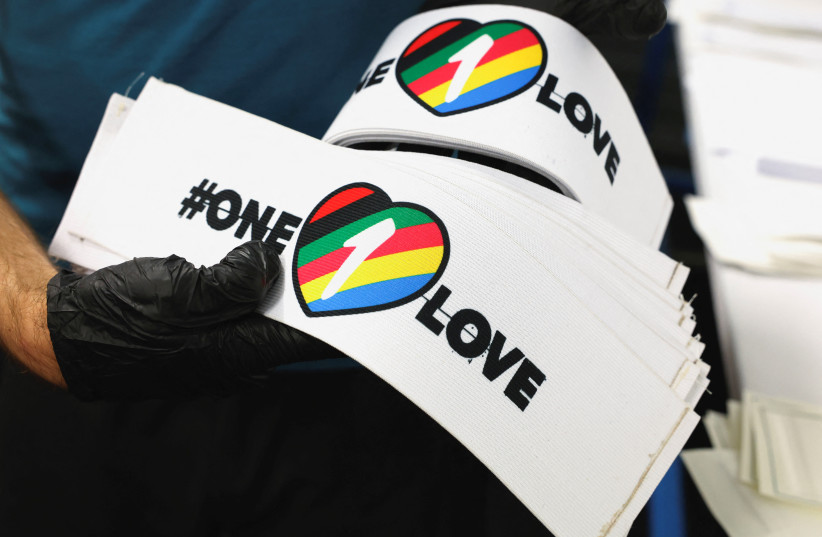Football and justice
Al-Masry Al-Youm, Egypt, November 25
For more stories from The Media Line go to themedialine.org
As I write these lines, Breel Embolo, a soccer player on the Swiss national team, scored the winning goal for his team in its World Cup match against Cameroon.
This might seem normal to the average reader, but those who are familiar with the player’s background will immediately understand the irony, since Embolo is Cameroonian by birth. One can only imagine how confused – and perhaps torn – the player felt when he scored the goal. Embolo couldn’t be happy or sad.
The sadness on his face wasn’t the “ordinary” sadness one would expect from a professional soccer player who beats his former team. Rather, it was sadness over injustice – the injustice that forced him to leave Africa, abandon his homeland and move to Switzerland.
Few professional opportunities exist for people in Africa. Therefore, exceptionally talented Africans – be they athletes, musicians, artists, or scholars – look to Europe for a better future. At home, they will have to face issues like corruption and nepotism. Abroad, they will have a fair chance for development and growth.
And while many talented Africans find themselves pursuing a professional career abroad, nowhere is this more heartbreaking to observe than in sports, where an African player may find himself playing against his own home country’s national team.

Soccer isn’t just a game. Rather, it is a microcosm of life. The World Cup is an opportunity for countries to demonstrate their skill and power against others. In beating Cameroon on the playing field, Switzerland affirmed its position as a force to be reckoned with.
It is a model for life, neither a continuous winner nor a continuous loser, Jürgen Klopp, the manager of Premier League club Liverpool, answered, when asked about his permanent smile even when his team loses. “It is because when my son was born, I realized that football is not a matter of life or death. We do not save people’s lives.”
Soccer should not spread misfortune, hatred and misery. Soccer should be about joy and inspiration. – Abdel Latif El-Menawy
Western values and the World Cup
Asharq al-Awsat, London, November 23
The FIFA World Cup is not just the premier sporting event in the Western world, but it is also an occasion to promote Western values across the globe.
For a long time, we’ve witnessed liberal values, which were once considered radical, assume the center stage of Western societies.
I’m not talking about the normalization of homosexuality or same-sex marriage. I’m talking about how the entire concept of gender has been questioned. There is no more “male” and “female,” but a wide host of other gender identities that people can assume. Even young children are being indoctrinated and taught these ideas and values at school today.
These values are being put to the test in the current FIFA World Cup games held in Qatar. The International Federation of Football Associations banned the wearing of gay symbols, badges and apparel during the games, including the “one love” badge.
This angered some European teams, including Germany’s national team, whose players were filmed covering their mouths – as if they are silenced – ahead of their first match.
The Germans lost that game to Japan, and some cynics commented on the score by showing a caricature of the German players with an image of a rainbow in their heads playing against the Japanese players, who had an image of a soccer ball in their minds.
According to a BBC report, seven European national team captains were expected to wear the “one love” armband during the games. The German Football Association claimed that “depriving us of wearing the armband is like depriving us of speaking.”
The only thing that FIFA allowed the captains of the teams was to wear the “no discrimination” badge throughout the tournament period. This is what Germany’s captain and goalkeeper, Manuel Neuer, did in the match against Japan.
However, the truth is that the Western insolence doesn’t even reflect all the players on the Western teams. For example, the captain of the French national team, Hugo Lloris, announced that he would not wear the armband, because he wanted to pay respect to his Qatari hosts.
They might not like it, but Westerners visiting Qatar for the World Cup games may just discover that the universe doesn’t revolve around their own values. They are neither the source of truth nor the ultimate manufacturers of noble values. Other societies, other peoples and other countries might not agree with their liberal philosophies and worldviews. They may have their own beliefs, but those beliefs are far from universal.
Perhaps a trip to Qatar is what it takes for them to understand this simple reality. – Meshary Al-Dhaidi
Translated by Asaf Zilberfarb.
